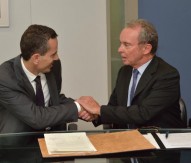
H2020: Europe’s research solution?
The president of the European Association for the Study of Diabetes (EASD) and the European Foundation for the Study of Diabetes (EFSD), Professor Andrew Boulton, outlines his thoughts on the EU’s next research and innovation funding programme, answering the question, is Europe now left playing catch-up after many years of lacking a co-ordinated research funding approach?
Not necessarily, as major boosts to European research have been implemented thanks to Horizon 2020. With a €70bn budget, Horizon 2020 is the EU’s main project aimed at funding research during the period 2014-2020. This however covers all areas of research, not just medical. The European Research Council (ERC) has injected steadily more and more funds into research and its commitment has seen a rise from €300m in 2007 to an estimated €1.7bn in 2013. In fact, by the end of the year, the ERC will have awarded, since 2007, approximately 5,000 grants, supported more than 10,000 doctoral students and more than 5,000 postdocs. It can also count five Nobel Prizes and three Fields Medallists to its accolade.
Unique problems
However, Europe also faces unique problems – the main one being the lack of research co-ordination at the EU, national and regional levels. The research community is dispersed among numerous nations. Therefore, it faces not only geographical challenges but also communication difficulties. One of the major goals of the Biomedical Alliance is to encourage collaborative, multidisciplinary partnerships across borders in order to accelerate the translation of discoveries into applications that impact healthcare delivery, particularly in times of economic austerity. It is only by addressing these issues that high quality research outcomes can reach European citizens as quickly as possible. Failure to achieve this would lead to Europe falling even further behind its global competitors.
But many will wonder, what are the benefits of medical research? Is it worth spending taxpayers’ money on? In days of economic turmoil, these are indeed valid questions. However, to say that the benefits of medical research outweighs any negatives in relation to expense is a gross understatement.
The costs may seem astronomical, but it is worth noting that, with diabetes alone, there are an estimated 371 million patients worldwide, with approximately $470bn (~€352bn) being spent on diabetes care. However, the number which is of most relevance, and truly shocking, is that in 2012, 4.8 million lives were lost due to this disease.
Dependency
Regardless of the ailment, each one of us depends on what was once a new treatment, a new medical device, a new vaccine, or, the ultimate goal of all researchers – a new cure. Each of these advancements comes about thanks to medical research. With each and every new discovery there are likely to be thousands of people who were involved in its production, thus creating employment and economic stimulus, and thousands or millions dependent on its use.
Great strides are being made thanks to bodies such as the European Foundation for the Study of Diabetes, which, thanks in part to third party support, subsidises researchers and helps the wider medical community achieve new levels of knowledge and strive for excellence in healthcare and disease management. Over the course of its 14 years, the grants and fellowships which the foundation has awarded have had a major impact on the quality of medical care for diabetes patients.
In our area of interest, each new study and each new clinical trial takes us one step closer to the ultimate goal of finding a cure for diabetes and the same can be said for all areas of medical research.
As Sir Humphry Davy once said: “Every discovery opens a new field for investigation of facts, shows us the imperfection of our theories. It has justly been said, that the greater the circle of light, the greater the boundary of darkness by which it is surrounded.”
Professor Andrew Boulton




